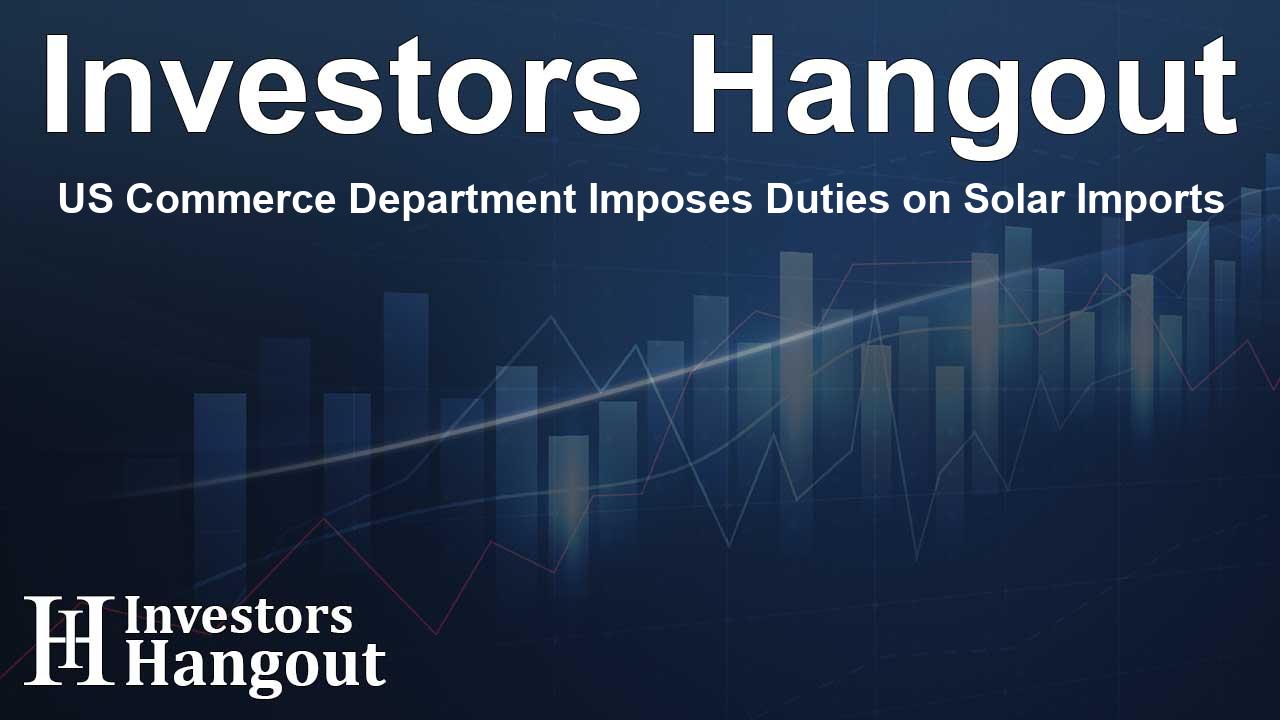US Commerce Department Imposes Duties on Solar Imports

US Commerce Department Takes Action Against Solar Imports
The US Commerce Department recently announced preliminary duties on solar imports from Southeast Asian nations. This decisive action follows findings that these imports have benefitted from illegal government subsidies.
Impact on Domestic Solar Manufacturers
This determination is seen as a significant victory for domestic panel producers. These manufacturers argue that the influx of cheap imports is detrimental to their operations and investment initiatives aimed at developing a robust US solar supply chain.
The Need for Protective Measures
In their petition to the government, domestic panel makers asserted that equipment is being sold below production costs due to these foreign subsidies. Implementing these duties is expected to ensure fair competition within the solar industry.
Higher Costs for Renewable Developers
With the imposition of countervailing duties, renewable energy developers will encounter immediate higher prices for solar panels. The rates will apply retroactively for many imports from Thailand and Vietnam, backdating as far as early July.
Historical Context of Solar Tariffs
This case marks the latest effort by US manufacturers to counter foreign competitors, a trend that began around 12 years ago with duties on Chinese solar imports. In response, many Chinese manufacturers have relocated their operations to unaffected regions across Asia.
Concerns Over Tariffs and Energy Transition
Chinese officials have voiced their concerns that these new tariffs could impede the pace of the US energy transition, as well as the country’s fight against climate change. The tariffs have faced criticism from certain foreign manufacturers and domestic renewable power developers. They argue that these duties may contribute to higher costs for solar power projects and unfairly favor larger American manufacturers.
Expert Opinions and Future Investigation
Abigail Ross Hopper, the president of the Solar Energy Industries Association, emphasized the need for solutions that not only support domestic manufacturers but also facilitate the rapid deployment of clean energy. The ongoing investigation into the solar import claims is expected to continue into the next spring, with possible adjustments to the duties based on the probe's findings.
Preliminary Duty Rates Overview
The initial general duty rates were assessed at 8.25% for Cambodia, 9.13% for Malaysia, 23.06% for Thailand, and 2.85% for Vietnam. Specific companies faced varied rates, such as imports from Hanwha Q Cells Malaysia Sdn. Bhd. at 14.72% and JinkoSolar Holding Co. Ltd. entities at 3.47%.
Market Reactions and Analyst Predictions
Although analysts noted the preliminary figures were lower than anticipated, the expectation remains that final rates could exceed those currently proposed. The concern lies particularly with major importers like Trina and JA, where the preliminary rates could prove insignificant. This outcome may also impact the shares of First Solar which has been positioned as a primary beneficiary.
Understanding the Trade Investigations
Moreover, the Commerce Department has aligned with manufacturers in determining that the recent surge in imports indicates 'critical circumstances' warranting retroactive duties for Vietnam and Thailand covering imports back to July 2. This case continues to evolve as further investigations focus on the potential dumping of solar imports below production costs.
The Broader Implications of Solar Tariffs
With the solar market rapidly developing, the outcome of this case could have lasting implications on the pricing and availability of solar technology in the US. As domestic producers and foreign manufacturers navigate this landscape, the importance of these duties will be monitored closely over the coming months.
Frequently Asked Questions
1. Why did the US impose duties on solar imports?
The US imposed duties to protect domestic manufacturers from unfair foreign subsidies that allow solar products to be sold at artificially low prices.
2. What are the new duty rates for solar imports?
The preliminary duty rates are 8.25% for Cambodia, 9.13% for Malaysia, 23.06% for Thailand, and 2.85% for Vietnam.
3. How will these duties affect solar project costs?
These duties are expected to increase the cost of solar projects as developers will face higher prices for imported panels.
4. What is the expected outcome of the ongoing investigation?
The investigation might result in adjustments to the duties based on findings, which are anticipated to be concluded by next spring.
5. How have foreign manufacturers responded to these changes?
Foreign manufacturers have expressed concerns that tariffs could disrupt the US solar market and increase costs for consumers while benefiting larger US manufacturers.
About Investors Hangout
Investors Hangout is a leading online stock forum for financial discussion and learning, offering a wide range of free tools and resources. It draws in traders of all levels, who exchange market knowledge, investigate trading tactics, and keep an eye on industry developments in real time. Featuring financial articles, stock message boards, quotes, charts, company profiles, and live news updates. Through cooperative learning and a wealth of informational resources, it helps users from novices creating their first portfolios to experts honing their techniques. Join Investors Hangout today: https://investorshangout.com/
Disclaimer: The content of this article is solely for general informational purposes only; it does not represent legal, financial, or investment advice. Investors Hangout does not offer financial advice; the author is not a licensed financial advisor. Consult a qualified advisor before making any financial or investment decisions based on this article. The author's interpretation of publicly available data shapes the opinions presented here; as a result, they should not be taken as advice to purchase, sell, or hold any securities mentioned or any other investments. The author does not guarantee the accuracy, completeness, or timeliness of any material, providing it "as is." Information and market conditions may change; past performance is not indicative of future outcomes. If any of the material offered here is inaccurate, please contact us for corrections.